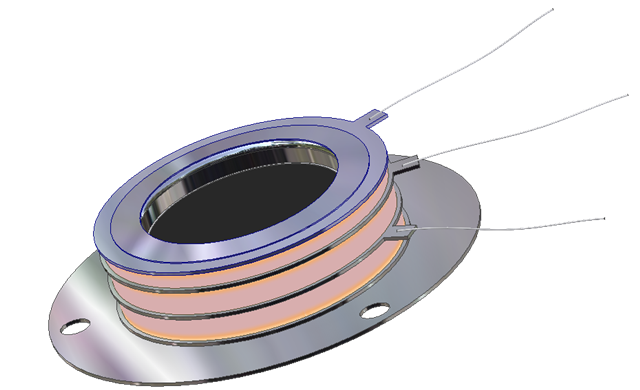Del Mar Photonics -
Newsletter
How to choose MCP detector
 |
Open Microchannel Plate Detector
MCP-MA25/2 -
now in stock!
Microchannel Plate Detectors MCP-MA series are an open MCP detectors
with one or more microchannel plates and a single metal anode. They are intended
for time-resolved detection and make use of high-speed response properties of
the MCPs. MCP-MA detectors are designed for photons and particles detection in
vacuum chambers or in the space.
MCP-MA detectors are used in a variety of applications including UV, VUV and EUV
spectroscopy, atomic and molecular physics, TOF mass–spectrometry of clusters
and biomolecules, surface studies and space research.
MCP-MA detectors supplied as a totally assembled unit that can be easily mounted
on any support substrate or directly on a vacuum flange. They also can be
supplied premounted on a standard ConFlat flanges.
buy online -
ask for research discount!
|
Del Mar Photonics has strong experience in the supply of Microchannel Plates
(MCP) and MCP detectors for variety of applications.
Please tell us about your application
and requirements so we can answer with detailed proposal in a timely manner:
1. What type of particles/photons you plan to detect?
2. What is the expected energy of the particles at the entrance of MCP
detector?
3. Tell us about the flux of the particles: is it continuous or pulsed? how
many particles per second or per pulse? in case of pulsed signal how long is the
pulse and what is the pulse duration and repetition rate.
4. Do you require detection or imaging of the particles? The required time
resolution will detrming if you need standard or special fast anode.
5. If you need to image or profile particle beam we offer MCPs together phosphor
screens (standard P20, P43 and P47 as well as many others). Choice of phosphor
is usually dictated by what readout (CCD or PMT) will be used.
6. If you need fast imaging we can offer special phosphors - please indicate
required imaging speed.
7. Do you need stand alone or flange mounted MCP detectors with high voltage
feedthroughs. In case of imaging applications flange mounted detectors are
supplied on a viewport.
8. What is the required active area of the detector?
9. Do you required configurations with single, double or z stack MCP detectors?
If you are not sure, your answers to the previous questions will help us to
offer you the right configuration.
Request a quote
To see few example of the MCP detectors that we offer please browse through
the following pages:
Microchannel
Plates and Detectors General Description -
MCP
34-10
Open MCP Detectors with Metal Anode
MCP-MA25 -
MCP-MA34
Open MCP Image Intensifier with Luminescent Screen
MCP-GPS25 - flange welded
Open MCP Image Intensifiers MCP-GPS46 and
MCP-IFP46 series
Open MCP Image Intensifier MCP-GPS 70x90 CF8"
Open MCP Assemblies Part Numbers and
Price List -
buy online
Microchannel Plates Part Numbers and Price List
-
buy online
Custom Made MCP Detectors and Systems
2 pi
Multiple MCP Detector
4 pi MCP Detector
-
Beam Imaging Detector (BID)
- Position sensitive MCP detectors for two dimensional on-line monitoring
of particles and synchrotron radiation beams
Curved Microchannel Plates
Microchannel Plates, Detectors
and Imaging Systems
Examples of research applications:
Studies of the atomic clusters at the
University of Virginia -
Amber Post
Featured MCP customer:
The Castleman Group at PSU
MCP home -
MCP references
-
Absolute ion detection efficiencies of a microchannel plate -
How to choose MCP detector
MCP-GPS-46/2-CF6" Open
MCP imaging detector mounted on CF6" flange -
MCP-GPS and
MCP-IFP imaging detectors
MCP-MA -
Detecting short proton
beam from a picosecond CO2 laser ionized H2 plasma
MCP-MA25/2 are used in aSPECT to
study the background
MCP setup for velocity map imaging apparatus
Microchannel Plate Detector (MCP) setup for Plasma Desorption Mass
Spectrometry (PDMS)
MCP detector for high resolution ion time-of-flight analysis for measuring
molecular velocity distributions
X-ray detection system based on the MCP/phosphor screen assembly
Analysis of biological molecules on surfaces using stimulated desorption
photoionization mass spectrometry
MCP detector for laser ablation/ionization experiment
A linear radiofrequency quadrupole ion trap for the cooling and bunching of
radioactive ion beams
